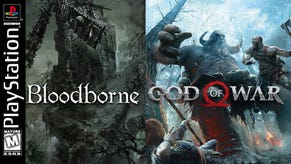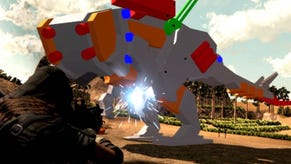Older PlayStation games heading to PC is a win for accessibility
But disability tax remains.
With the launch of the PlayStation PC label for Sony's PC ports, more players are able to enjoy titles such as Horizon: Zero Dawn, Days Gone, and God of War. With these being ports, accessibility improvements are usually only minor parts of the package - such as keyboard and mouse remapping. But with PC, the existence of third-party mods can open up areas of the games that could allow disabled players to better enjoy them.
I wanted to talk with a few disabled people about how these mods are a good thing for making older PlayStation games more accessible. I wanted to hear about the restrictions, but I also wanted to highlight how, going forward, studios can allow disabled players to not have to rely on third-party mods in future ports.
First though, it's just an interesting time for accessibility mods in general. "Before the mod, I wouldn't have been able to play Hearthstone at all" disabled streamer and accessibility consultant SightlessKombat tells me when talking about Heartstone Access, a mod released in 2021 that makes the 2014 digital collectable card game accessible to the blind. However, only portions of the game are updated with the mod's custom code that's injected to allow screen reader support. (More updates are planned.) Sightless explains that it felt as if a world of possibilities had opened up, "even if that world was severely limited by the amount of work it takes to implement new features into said mod."
But this is just one example of accessibility-focused mods. There was a Cuphead assist mod that upped health, weapon damage, and coins. There's also a Stardew Valley screen reader mod while Hades has a blind and visually impaired mod. These types of mods open up video game playability to a wider audience by adding mechanics and features in areas where the original game hadn't flourished. This is often in part due to games being developed before accessibility was as mainstream a topic as it's become in recent years.
With blockbuster PlayStation games from years ago heading to PC, we're seeing similar mods surfacing.
Days Gone has numerous mods available ranging from super accuracy, infinite ammo, and unbreakable items, to name a few. These are all mods that could make the game less taxing for those with cognitive disabilities, or even those with mobility disabilities who find it easier to just play rather than collecting ammo constantly. Horizon: Zero Dawn also has mods in the form of New Game+ saves that allow for higher level items, so players can breeze through the story and engage in the narrative aspect of the game.
Paul Amadeus Lane, a disabled accessibility consultant, spoke to me about the existing mods. "Everyone should have an opportunity to experience gameplay in its entirety," they tell me. "These accessibility mods will allow more and more disabled gamers to enjoy some of these amazing games." Lane explains that there is a segment of the population that prefer PC gaming over console gaming, and "anything that will make our tent wider when it comes to gaining is a huge plus."
While mods can make a game more accessible, it's important that studios don't rely on third-party mods. It's important they ensure games are being developed with accessibility in mind. "Modders should never be relied on as the means of making your game accessible" Sightless explains, adding that "accessibility should be a key part of a game's fabric, not something that is added later".
This sentiment is also shared by Lane who says, "Software designing is key. If accessibility features are built in through the software it allows new updates to current accessibility features or even new accessibility features that were not known at the time of the game creation."
2018's God of War launched on PC in January 2022, and so it's most likely too early to see many accessibility-focused mods. While the game's PC launch didn't see any fixes to previous accessibility concerns that have bene present since its initial launch, such as small text and small prompts, fixing these with mods isn't a simple solution.
"Mods won't be able to fill the void of features that PlayStation ports on PC have missed," Sightless says. "Things like navigation/traversal assistance, menu and UI narration, combat assistance, etc, as they were not planned for when the game was developed and hooking into games to add those features is sometimes not only difficult but impossible depending on how the game was constructed."
As it happens, mods were discussed in an GameInformer interview with Sony Santa Monica's creative director Cory Barlog, and senior manager of technical production Matt DeWald. (The mods they were discussing were likely character and weapon models rather than mechanical changes.) DeWald explains that the studio didn't build modding support into the game. "Everything we have is custom, so it's really hard to build some of that stuff," he says. Barlog also doesn't see modding support as something that will happen in the future, explaining, "Our tools are difficult. That's just how we roll. We like to have difficult tools. Our engine wasn't really built to support that. Our tools are super custom and inherently complicated."
 God of War on PC - Digital Foundry Tech Review - PlayStation vs PC, Performance, Optimised Settings!
God of War on PC - Digital Foundry Tech Review - PlayStation vs PC, Performance, Optimised Settings!
Despite the accessibility issues, Santa Monica Studio did implement minor accessibility improvements for mobility to the PC port. Speaking to disabled video game journalist Grant Stoner, he tells me, "[God of War] is probably one of the most accessible ports that I've played in years."
Stoner highlights that simply being able to use a mouse and keyboard or the adaptive controller, "is one of the most beneficial aspects of PC games." Equally, "because PlayStation doesn't offer any form of accessible hardware, disabled players would need to invest in controls that are not only functional for them, but also compatible with the PS5."
Lane also points to how software integration benefits user cost, "Software integration helps keep the cost under control so that disabled gamers won't get hit with the hidden disability tax where we have to pay more to enjoy what others that have no disabilities are able to enjoy."
An example of this hidden disability tax could come through the requirement of purchasing third-party equipment to be able to play at all. As Stoner puts it, "I have a custom PS5 controller, but that cost over $300. Not many disabled people can afford something like that."
So while mods, whether intended for accessibility or not, can improve disabled players' experience of playing PlayStation games, there are still areas that most likely cannot be improved with mods. But on that note, smaller mods such as enhanced aiming, New Game+ saves, health and stamina changes can all be useful for accessibility and could improve the gameplay experience.
Furthermore, the existence of mods and the benefits noted above shouldn't deter studios from implementing features at a software level and building accessibility into their game's design. Not only will developing with accessibility in mind early on help keep development costs down, but including features that allow for more freedom for playing will keep the cost of disability tax down.


















